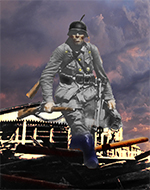
Nazi Germany - The Political History
Chronology of Political Events
1813
- October 14 - 18 - Battle of Leipzig (Battle of Nations) -
French army defeated by combined armies of Russia, Austria, Prussia, and Sweden - December 22 - Allied armies begin crossing the Rhine River into France, after Napoleon ignores peace offer
1814
- March 9 - Battle of Laon -
Prussian army, under General Gebhard Leberecht von Blücher, decisively defeats French, seventy-five miles northeast of Paris - March 30 - Battle of Montmartre
French forces defeated in last-ditch defense of Parisw - March 31 - Paris surrenders and Napoleon flees to Fontainebleau
- April 4 - Napoleon agrees to abdicate
- May 4 - Napoleon lands on Elba, to begin exile
- May - First Peace of Paris -
Allies restore Louis XVIII to French throne and conclude treaty - October 1 - Congress of Vienna (October 1, 1814 - June 9, 1815) opens
1815
- March - Napoleon escapes exile in Elba and lands in France
- June 9 - Final Act of Congress of Vienna adopted
- Germanic Confederation -
Congress of Vienna creates Germanic Confederation -- Number of recognized German political units is reduced from over 300 to just thirty-eight states
- Austria and five kingdoms of Prussia, Hanover, Bavaria, Württemberg, and Saxony become members, as well as free cities of the north
- Austria is assigned permanent presidency of the Confederation
- Federal Constitution creates central legislative body called the Diet to represent member states of the Confederation, although the Diet has little power to force individual member states to accept its decisions
- Rulers of member states are to appoint representatives to the Federal Diet, which will meet periodically at Frankfurt on the Main
- Federal Constitution (Article XIII) provides that member states should have constitutions creating legislative assemblies of the estates
- Constitution authorizes Diet to create a federal army
- June 18th - Battle of Waterloo
Napoleon defeated by Anglo-Dutch and Prussian armies under Wellington - October 17 - Napoleon arrives at St. Helena to begin exile
- November 20 - Quadruple Alliance treaty signed
Four allied Great Powers (Austria, Britain, Prussia, and Russia) agree to cooperate in maintaining peace in Europe
1816
- Student societies - Burschenschaften - are organized at universities across Germany
Branches at sixteen universities form part of a national federation
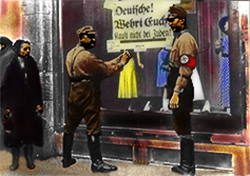
1817
- Burschenschaft of the University of Jena convokes national assembly at Wartburg Castle on the fourth anniversary of the Battle of Leipzig
1819
- Karl Sand, a disturbed student, attacks a playwright named Kotzebue, believing him to be a Russian spy, and stabs him to death
- August - Clemens von Metternich, Austrian foreign minister, in response to the murder, summons representatives of the principal German states to Carlsbad
- Carlsbad representatives draw up a series of decrees, dissolving the Burschenschaften and imposing strict censorship of the press and universities in all the German states
- The Federal Diet will later approve the decrees
1830
- July Revolution in France
- July 27 - Police fire on a crowd gathered at the Place du Palais Royal, killing several protestors
- July 28 - July 30 - Three days of street-rioting in Paris force King Charles X to flee
- August 2 - Charles X abdicates
1832
- June - Federal Diet passes a series of measures intended to limit power of the state representative assemblies
- Diet decrees that assemblies do not have the power to limit the authority of their princes and cannot use their financial powers to extract concessions from the princes
1848
- February 22 - Opposition forces in Paris assemble for a "reform banquent," likely to include antigovernment speeches
- After first refusing to allow the assembly, King Louis Philippe becomes alarmed by the size of the protests on the streets, and dismisses Guizot, his chief minister, in hopes of placating protesters
- February 23 - Following an encounter between protesters and soldiers, soldiers fire volley into crowd which kills some fifty people
- In response to the shooting, protestors barricade streets at 1500 locations in Paris, and students attack police stations in an attempt to procure arms
Some 370 people have been killed, by the time the clashes between the protesters and the authorities end - February 24 - Louis Philippe abdicates and flees to England
- February 29 - Crowds gather in Austrian capital, Vienna, to hear news of unrest in other parts of Europe
unease leads to run on banks, steep rise in food prices, and mounting criticism of government - March 3 - Demonstrators take to streets in Cologne
- March 6 - Demonstrations begin in Berlin
- March 13 - 15 - Rioting erupts in Vienna and Metternich flees
- March 18 - 19 - Protesters in Berlin erect barricades in streets and are fired on by army units.
King Frederick William withdraws troops from Berlin to avoid further bloodshed. - April 28 - France holds elections to Constituent Assembly
- May 15 - Radicals in Paris storm the National Assembly but are disbursed by troops and the National Guard
- June 21 - Government issues decree requiring recipients of public funds to either leave Paris for public works projects in remote provinces, join the army, or do without public assistance
- "June Days" - June 22 - June 26 - unemployed workers and radicals erect barricades and try to take control of Paris
government deploys twenty-four battalions of Mobile Guards in response
some 1,500 revolutionaries are killed by government forces in the initial response; an additional 3,000 are killed in reprisal attacks - October 18 - Street fighting in Frankfort between supporters of the moderate majority and radicals
- November 10 - Field Marshall Wrangel, commanding 40,000 Prussian troops, re-enters Berlin, disarms the citizens' guard and restores order.
- December 5 - Frederick William IV grants constitution by royal decree
Constitution creates a bicameral legislature - membership in upper house to be mostly hereditary appointments of nobility; membership in lower house elected by district conventions, with voting weighted toward wealthier groups
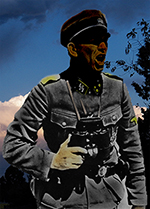
1849
- May 3 - Unrest leads to street fighting in Dresden, capital of the kingdom of Saxony
- May 9 - Prussian troops are ordered in to Dresden and some 250 people are killed before order is restored.
- May 30 - Frankfurt Parliament's rump votes to meet in Stuttgart
- June 18 - Prussian troops enter Stuttgart and disburse rump Parliament meeting
- June 23 - Rebels defending Rastatt surrender to Prussian troops, following bombardment
1858
- Prussian king Frederick William IV yields throne to brother William, who becomes regent
1860
- February - William presents Prussian parliament with army reorganization bill
- Bill provides for an increase in number of annual conscripts, effectively doubling size of regular army
- Term of service increased to three years
- Role of Landwehr (civilian militia) reduced
- Military budget increased
- Opposition to bill forces William to withdraw proposed legislation, but government requests appropriation of 9,000,000 thaler for the military, an unusually large increase
the Chamber of Deputies approves the request, relying on assurances that the monies will not be used to implement William's reorganization plans - Once money is appropriated, William ignores understanding and begins to put reform plans into effect.
1861
- January - William becomes king of Prussia (Kaiser Wilhelm I)
1862
- January - William re-submits 1860 proposals, which are rejected by the Chamber of Deputies
- William dissolves the Chamber and calls for new elections
- May - Elections result in a stronger liberal majority opposing William
- September - William appoints Otto von Bismarck as his minister president
1863
- November - New Danish constitution declares Schleswig, a province on the border between Prussia and Denmark, to be part of Denmark
1864
- Prussia and Austria issue ultimatum to Denmark, demanding revocation of new constitution
- Denmark refuses demand, and Prussia and Austria declare war
- Danish-Prussian war - Prussian army conducts successful assault of Düppel and final outcome of campaign is a defeat for Denmark
1865
- August - Convention of Gastein
Austria and Prussia agree to divide administration of Schleswig and Holstein:
Austria to administer Holstein; Prussia to administer Schleswig
1866
- April - Bismarck announces support for reform of Germanic Confederation, which will include the creation of a national assembly elected by universal manhood suffrage
- June 1 - Austria brings Schleswig-Holstein dispute with Prussia before the Diet of the Germanic Confederation
- Prussia orders troops into Holstein
- June 14 - Diet votes in favor of motion to take military action against Prussia
- Prussia declares Confederation dissolved Austro-Prussian War (Seven Weeks War)
- June 24 - Austrians defeat Italians at Custoza
- July 3 - Battle of Sadawa (Königgrätz) (Czech Republic, near Elbe River)
- Helmuth von Moltke (Moltke the Elder), commanding Prussian forces, defeats larger Austrian army commanded by Lajos von Benedek
- Dreyse "needle gun," a breech-loading rifle, employed by Prussian infantry for first time
Prussians are able to fire lying down from concealed positions, with accuracy, before Austrians come into range with muskets - Austrians and Saxons suffer 44,313 casualties; Prussian losses are 9153
- Prussian rail network allows Moltke to transport troops quickly
- August - Peace of Prague
- Austria agrees that it will no longer be a part of Germany
- Prussia granted control of the lands of the German allies of Austria
Kingdom of Hannover, free city of Frankfurt, and the duchies of Nassau and Hesse-Cassel become part of Prussia - September - Chamber of Deputies votes to approve compromise proposal by Bismarck
Government admits that it had acted in violation of the constitution by operating without a budget since 1862;
in return Chamber agrees to indemnity bill which legitimizes all past military expenditures - October - Progressive Party splits -
supporters of Bismarck form the National Liberal party
1867
- July - Formation of North German Confederation
- Comprised of twenty-two German states north of the Main River, now including Saxony
- Presidency to be held by the king of Prussia
- Bicameral legislature created - consisting of a legislature (Reichstag) and a Federal Council (Bundesrat)
- Reichstag members are to be elected by universal manhood suffrage
Reichstag has budgetary powers and the power to debate and approve all laws but not the right to initiate legislation or to control foreign or military policy - Bundesrat delegates are appointed by princes of federal states, the power of veto over Reichstag laws, and the right to approve ammendments proposed by the Reichstag
- Prussian dominance reinforced by holding of 17 of 43 seats in the Bundestag, the collection of the federal state delegations which appointed members of the Bundesrat
1870
- July 2 - Prince Leopold of Hohenzollern, distant relative of Prussian King William I, accepts Spanish throne
- July 19 - France declares war on Prussia Franco-Prussian War
- August 6 - Battle of Wörth
Prussian Third Army defeats French I Corps in Alsace - August 18 - Battle of Gravelotte
Prussian force of 188,000, under Moltke, attack French force of 113,000, commanded by François Bazain at village of Greavelotte in Lorraine
Despite suffering heavier casualties, Prussians force French to retreat - September 1 - 2 - Battle of Sedan
Prussian and Bavarian force of 200,000 occupy hills above Sedan, trapping French army of 120,000, which is then bombarded by Prussian artillary
September 1 - French suffer over 17,000 casualties in afternoon attempt to dislodge Prussians; 21,000 French troops are captured
September 2 - French emperor Napoleon III, surrenders, along with remaining French army of 83,000 - September 3 - October 23 - Blockade of Metz
French Army of the Rhine besieged by Prussians at Metz
French surrender on October 23, after failing to break out of city - September 19 - Prussian army surrounds Paris and begins siege
- October 27 - French army fails to break out of Paris
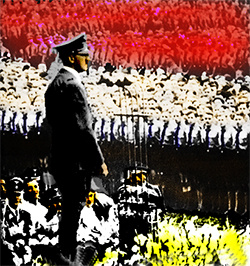
1871
- January 19 - Second Paris break-out attempt by French army fails
- January 28 - Paris capitulates and concludes armistice treaty with German forces
- February 8 - France holds elections for National Assembly
Adolphe Thiers selected as Prime Minister - March 18 - May 28 - Paris Commune
- Thiers issues order that National Guard should hand over its artillary to regular army
- Troop of cavalry is sent to National Guard munitions park on the Butte Montmartre to remove guns
- Cavalry troop is attacked by mob of angry Parisians, and its commanders are killed in the fighting
- National Guard forces march on the center of Paris and seize the Hôtel de Ville
- Thiers orders government forces to withdraw from Paris; government operations are moved to Versailles
- March 26 - General Council of 90 members elected to direct activities of Commune
- April 2 - Government forces seize Courbevoie, a suburb of Paris and move to re-take city
- May 16 - Army forces enter Paris at undefended point on southwest side
(May 21 - May 28 - Bloody week - army moves to re-capture city - May 28 - End of organized resistance as government forces re-take Paris
- Some 20,000 Communards estimated to have been killed in the week following the end of the fighting;
some 40,000 taken prisoner: thousands later deported to New Caledonia, in the South Pacific - April - German imperial constitution promulgated
the newly acquired states, including Alsace-Lorraine, are formally combined with the states of the North German Confederation, created in 1867, to form a united government of Germany - May - Treaty of Frankfurt
France agrees to pay war indemnity of five billion francs
France to be occupied by German troops until indemnity paid
Alsace and most of Lorraine ceded to Germany
1878
- May - Assassination attempt on emperor
- June - Emperor seriously wounded in second assassination attempt
Bismarck dissolves Reichstag and calls for new elections - October - Anti-Socialist Law introduced and passed by Reichstag
"Subversive" or "socialist" associations and publications were forbidden;
police given broader powers of interrogation, arrest, and expulsion
Socialist leaders leave country or are arrested
1881
- Bismarck inaugurates a program of social insurance legislation designed to help workers
1883
- Reichstag passes Sickness Insurance Law
employees and employers are to make contributions to finance the plan
1888
- March 9 - Kaiser Wilhelm I dies
- William's son succeeds to throne, taking tile Frederick III
- June 15 - Frederick dies from throat cancer, three months after taking throne
- Son, William (Wilhelm II), succeeds to throne
1889
- April 20 - Adolf Hitler born
1890
- January 24 - Clash between Wilhelm II and Bismarck at privy council meeting over social legislation
- March 15 - Meeting between Wilhelm II and Bismarck
Wilhelm has heard that Bismarck has been seeking political support to oppose him - March 18 - Bismarck resigns
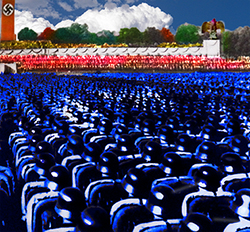
1898
- July 30 - Bismarck dies at eighty-three
1914
- June 28 - Austrian Archduke Franz Ferdinand and wife, assassinated by Serbian separatists in Sarajevo
- July 28 - Austria declares war on Serbia
- July 29 - Austro-Hungarian forces bombard Belgrade
- July 30 - Tsar Nicholas II orders total mobilization in Russia
- August 1 - Germany declares war on Russia
- August 3 - Germany declares war on France
- August 4 - Germany invades Belgium
Britain declares war on Germany - December - German and Allied forces stalemated in trenches along French frontier
1916
- July - November - Battle of the Somme
1.2 million men killed or wounded
1917
- April 6 - America declares war on Germany
- July - November 20 - British commander Haig attempts drive against Germans in Flanders
Third battle of Ypres costs British 150,000 dead and 300,000 wounded or captured
1918
- March 3 - Treaty of Brest-Litovsk
Bolsheviks agree to German demands and pull Russia out of war - March 21 - German spring offensive, planned by General Erich Ludendorff, begins
German army makes huge territorial gains - August 8 - German advance is stopped by English and French counter-attack forcing Germans to retreat
- October 3 - Ludendorff, realizing offensive has failed, urges German government to sue for peace
- November 4 - Workers in the town of Kiel establish a Workers and Soldiers Council on the Soviet model
- November 7 - Bavarian king deposed; Kurt Eisner becomes prime minister
- November 8 - Constituent Soldiers, Workers, and Peasants Council established in Munich under the leadership of the Independent Socialist Kurt Eisner
Council proclaims the establishment of a Bavarian Democratic and Social Republic - November 9 - Prince Max von Baden, acting Chancellor, announces that he is relinquishing his duties and turning his office over to Friedrich Ebert, head of the Majority Socialist party, who would serve as Reich Chancellor
Phillip Scheidemann, in the afternoon, in a speech to a mass demonstration in front of the Reichstag declares "long live the great German Republic"
Contingent of 3,000 sailors moves into kaiser's palace to protect the new governement, then refuse to leave - November 9 - Ebert begins working with General Wilhelm Gröner, of Supreme Army Command, to ensure public order against possible Bolshevik opposition
- Free corps (Freikorps) beginnings -
Ebert authorizes colleague Gustav Noske to recruit ex-soldiers as a volunteer force to protect government
across Germany, former officers begin organizing ex-soldiers into military bands to cope with local disorder, to fight communism, or to guard the eastern frontiers - November 11 - German representatives sign armistice terms, ending World War I
- November 25 - Conference of German states
Representatives of the several states meet in the Berlin Reichs Chancellery to discuss proposals for a constitution - December 16 - 19 - Workers' and Soldiers' Council meets in Berlin
Socialists prevail in voting - December 23 - Spartacists (Spartacus League) (Spartakusbund), a communist group, together with sailors of Volksmarine Division, attempt takeover of government in Berlin
- December 25 (Christmas Day) - Army division, commanded by General Lequis, takes up position outside palace, still occupied by sailors, and begins bombardment
Attack destroys much of building, but forces sailors (Spartacists) to capitulate - December 30 - Spartacists rename themseleves Communist Party of Germany (Kommunistische Partei Deutschlands)(KPD)
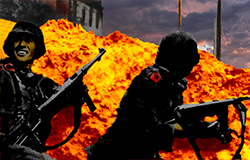
1919
- January - Paris Peace Conference begins
- January 5 - Street fighting begins in Berlin when Independents and Communists take to streets to oppose Social Democratic government
- January 6 - 12 (Bloody Spartacus week)
- January 10 - Freikorps units advance into Berlin
- Reinhard Brigade re-captures munitions plant at Spandau
- Freikorps fighters kill 156 Communists in the battle at the police presidium
- Potsdam regiment (Stephani's Free Corps) of the Freikorps massacres defenders of the Vorwärts as they surrender
- Attack on the Belle-Alliance Platz involves flame-throwers, machine guns, mortars, and artillery
- by the end of the fighting some thousand revolutionaries have been killed
- January 15 - Freikorps officers abduct and murder two communist leaders, Karl Liebknecht and Rosa Luxemburg
- January 19 - National Assembly elections held across Germany
Social Democrats receive over 11.5 million votes, out of thirty million, giving them 163 seats, out of national assembly's 421 - February 6 - Weimar Parliament -
Deputies elected to National Assembly begin meeting in Weimar - February 11 - Weimar delegates elect Friedrich Ebert president of the Reich
Philipp Scheidemann becomes first chancellor - February - Freikorps units move against communists in cities throughout Germany
Bremen, Wilhelmshaven, Halle, and other towns are pacified - February 21 - Bavarian prime minister Kurt Eisner shot to death by Nationalist officer Count Arco-Valley
- February 24 - Draft of Weimar Constitution is introduced
- March - Communists call general strike in Berlin, which brings renewed fighting
Some 1500 killed in fighting before Freikorps units restore order - March 17 - Social Democrat Johannes Hoffmann chosen minister presiden of Bavaria
- March 21 - Bavarian Soviet Republic proclaimed in Munich; Johannes Hoffman and ministers flee
- April 7 - Communists, led by Rudolf Egelhofer, oust Bavarian Soviet government
Communists enlist support of workers and unemployed and allow supporters to raid banks, invade homes, and confiscate property - Hoffman government calls for opposition to communist government, asks Berlin government to send Freikorps units
Freikorps units on way to Munich begin killing suspected Communists, including fifty-two Russian war prisoners murdered in their camp, and a group of medics - Communists in Munich, in retaliation for Freikorps killings, shoot members of the nationalistic Thule Society, being held as hostages
- May 1 - Freikorps units enter Munich and, after bitter street fighting, retake city
large number of Communists killed in fighting, including many after surrendering
suspected Communist sympathizers killed - twenty-two members of the Catholic St. Joseph's Club are murdered
Communist Fritz Seidel, who had ordered the killing of hostages, is executed, following his capture - April - May - communist uprisings in Magdeburg, Dresden, and Leipzig put down
- June 28 - Treaty of Versailles signed by German representatives in the Hall of Mirrors at Versailles
- Under Article 231 of Treaty (War-Guilt Clause), Germany was required to accept responsibility for the war
- Treaty includes demand that Kaiser Wilhelm II be tried for war crimes
in 1920 the Netherlands government would refuse Allied demands to surrender Wilhelm, who had taken refuge in Holland at the end of the war, questioning the legality of the request - Germany required to make reparations, although the final amount will not be set until 1921
- Size of German army limited to 100,000 officers and men; navy ship size limited to 10,000 tons, with no submarines
- August 11 - Weimar Constitution adopted
Article 48 of constitution provides that chancellor can rule by emergency decree - September 12 - Adolf Hitler attends meeting of German Workers' Party (Deutsche Arbeiterpartei)(DAP), later joins
46 people in attendance - November 18 - General Paul von Hindenburg, appearing before national assembly's committee investigating the conduct of the war, claims that the German army had not lost the war, but had been "stabbed in the back" by the political parties
Nationalists will later use phrase in attacks on the "November criminals" - the representatives who had signed the Armistice Agreement in 1918
1920
- February 24 - Hitler speaks before crowd of nearly 2,000 at first mass meeting of the German Workers' Party in Munich's Hofbräuhaus
- March - German Workers' Party (DAP) changes name to the National Socialist German Workers' Party (Nationalsozialistische Deutsche Arbeiterpartei (NSDAP) (Nazi Party)
- March - Kapp Putsch
Commanders of Freikorps units attempt to set up military dictatorship in Berlin - March 12 - Free Corps units, commanded by General Walther von Luettwitz and Captain Hermann Ehrhardt (Ehrhardt Brigade), advance toward Berlin from Döberitz, some twenty-five miles from Berlin
Reichswehr army units in Berlin do not move to defend city
Ebart government flees Berlin; once reaches Dresden, calls for a general strike in Berlin - March 13 (Saturday) - Free Corps force reaches Berlin and occupies abandoned chancellery and government offices
announce that Ebert government has been deposed
new Reich chancellor is Dr. Wolfgang Kapp, provincial director of East Prussia - workers and trade unionists refuse to work, in response to Ebert government's call for a general strike
strike paralyzes city - streetcars do not run, electricity is cut off, and water supply dwindles - March 17 - Free Corp units, acknowledging that coup has failed, march back to barracks at Döberitz
units, while leaving, fire into crowd at the Brndenburg Gate, killing some bystanders - March 21 - Plebiscite in Silesia
majority - 700,000 - vote to keep Upper Silesia German; supporters of Polish rule receive 479,000 votes
Polish volunteer units clash with German Free Corps units
League of Nations sets up committee which later decides to partition Upper Silesia, contrary to German wishes - April 1 - Adolf Hitler honorably discharged from the German Army
- April - Reacting to Kapp Putsch, workers in the Ruhr and Saxon Vogtland, organize armed units to oppose any right-wing coup
- June 6 - National elections -
Government coalition suffers major defeat - voting support drops from 19 million to 11 million;
support of rightist parties increases from 5.6 million to 9.1 million;
Communists increase from 2.1 to 5.3 million votes - November - First Assembly of the League of Nations takes place in Geneva
1921
- May - Allied Reparations Commission sets total German war reparations at 132 billion gold marks (32 billion dollars)
debt to be repaid at six percent interest over 37 years - August 3 - Sturmabteilung Hitler (SA - Assault Detachment Hitler) (Storm Troopers) (Brown Shirts) - Ernst Röhm's unit of strong-arm recruits receives official designation within Nazi Party
- August - Matthias Erzberger, one of Signatories of November 1918 armistice, murdered while walking in the Black Forest
- November 4 - Battle in the Hofbräuhaus - SA storm troopers engage in brawl with Social Democratic hecklers at meeting
despite injuries storm troopers and Nazi supporters remain in control of hall
"myth of the SA" as an organization to be feared is created - NSDAP membership reaches 6000
1922
- Genoa Conference -
April 16 (Easter Sunday) - Rapallo Treaty - German delegation, under Foreign Minister Walther Rathenau, agrees to pact of friendship and collaberation with Soviet Union - June - Walter Rathenau shot and killed while driving to work in Berlin
- November 1 - March on Rome -
Benito Mussolini and Fascist supporters (Blackshirts) enter Rome to take control of government
1923
- January - Hermann Göring replaces Ernst Röhm as head of the SA
- January 11 - France and Belgian troop occupy Ruhr
French prime minister, Raymond Poincaré, uses German failure to make scheduled timber and coal shipments, as pretext to dispatch troops in
French and Belgian occupation force totals 100,000 men by summer
French action brings passive resistance campaign by Germans which triggers inflationary spiral and economic difficulties
- January 28 - Nazi Party Day -
Hitler defies Munich authorities to hold open-air rally attended by 6,000 storm troopers - March - SS (Schutzstaffel) (protection squad) beginnings -
Hitler creates Headquarters Guard (Saalschutz) as a personal protection force - May - Headquarters Guard is replaced by Raiding Squad (Stosstrup) Adolf Hitler, a larger, more organized unit
- Summer - Government support of passive resistance to French occupation of the Ruhr leads to severe inflation
- August 1923 - Reichsbank issuing 46 billion fresh marks per day
- November 8 - Munich Beerhall Putsch
Hitler attempts ouster of Bavarian government
leads detachment of storm troopers into Bürgerbräukeller, climbs on table and fires shot into ceiling, before declaring that Reich and Bavarian governments deposed - November 9 - Street battle between Bavarian police and Hitler's followers leaves four state policemen and fourteen of Hitler's followers dead
- November 11 - Hitler arrested
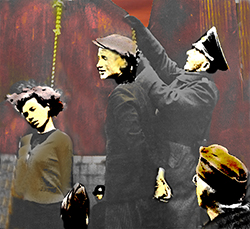
1924
- February 26 - Treason trial of Hitler and followers begins in Munich
- March 27 - Treason trial ends
- April 1 - Hitler found guilty, sentenced to five years in prison, but eligible for parole in six months
- August 16 - Dawes Plan agreement-
Agreement provides for reduction of German reparations payments and withdrawal of French forces from the Ruhr within a year - December 20 - Hitler released from Landsberg prison
1925
- January 3 - Mussolini declares himself dictator of Italy
- February 28 - Friedrich Ebert, first president of Germany, dies from effects of ruptured appendix
- March - SS (Schutzstaffel) (Protection Squad) created
Hitler orders Julius Schreck to re-organize security detail and to create a new unit for personal security - March 29 - German presidential election
Seven candidates run, but none receives a majority - April 26 - run-off election -
Field Marshall Paul von Hindenburg wins with 14,655,766 votes, defeating Catholic party's Wilhelm Marx, (13,751,615 votes) and Communist party's Ernst Thälmann (1,931,151 votes) - April 17 - Ernst Röhm resigns as leader of SA
- August 2 - Heinrich Himmler joins SS
- November 9 - SS officially recognized as an organization within the Nazi Party
- NSDAP membership increases to 27,117
1926
- April - Josef Berchtold replaces Julius Schreck as leader of the SS
Erhard Heiden becomes Berchtold's deputy - Hitler Youth (Hitlerjugen) established
- September 9 - Germany admitted to League of Nations
- November - SS subordinated to SA
- NSDAP membership increases to 49,573
1927
- September - Himmler becomes Erhard Heiden's deputy in SS
1928
- General election - NSDAP receives 810,000 votes, for 12 out of 491 seats in the Reichstag
1929
- January 20 - Heinrich Himmler becomes National Leader of the SS
- October 3 - Gustav Stresemann, German foreign minister, dies suddenly of a stroke
- October 24 - Great Crash - New York Stock Exchange Crash
1930
- July - Otto Strasser (brother of Gregor Strasser) leaves NSDAP to set up rival Union of Revolutionary Socialists (Black Front)
- SA membership increases during year to between 60,000 and 100,000
- August 23 - Walter Stennes, SA-Oberführer Ost (SA-Senior Leader East), with SA members, attempts to meet with Hitler to pressure for greater SA funding and influence;
Hitler refuses to meet with delegation - August 28 - SA members invade Berlin NSDAP headquarters and beat up business manager
- August 30 - mob of Berlin SA members attacks party headquarters, beats up seven SS guards, and smashes furniture
Berlin police called in and arrest twenty-five SA members
SA dispute leads to recall of Ernst Röhm to head SA - September elections - NSDAP receives 6,371,000 votes, for 107 out of 491 seats in the Reichstag
Nazi Party becomes second-largest party after the Social Democrats
1931
1932
- Hindenburg's presidential term due to expire on May 5
Hindenburg stands for re-election
Elections scheduled for March 13 - February 22 - Joseph Goebbels announces Hitler's candidacy for President
- February 26 - Hitler becomes German citizen
Hitler had not been a citizen of Germany prior to that time - March 13 election - Nearly 38 million votes cast
Hindenburg receives 18,651,497, 49.7 per cent of votes, but is 170,000 votes short of majority
Hitler receives 11,339,446 million votes, for 30.2 per cent - April 10 - Second presidential election round
Hindenburg re-elected with 19,359,983 million votes (53 per cent)
Hitler increases vote to 13,418,547 million (36.8 per cent) - April 14 - Chancellor Heinrich Brüning decrees suppression of S.A. and S.S.
- May 30 - Hindenburg names Franz von Papen chancellor, replacing Brüning
- July 31 - Reichstag elections -
Nazi candidates make signifigant gains - delegates increase from 108 to 230 delegates - September 12 - Reichstag dissolved
- November 6 - national elections for Reichstag seats
Nazis lose votes, and 34 seats, for 196 deputies
Chancellor Papen's support reduced to 62 delegates, out of 584 seats - December 2 - General Kurt von Schleicher appointed chancellor, replacing Papen
- Nazi party membership at end of 1932 is 450,000
1933
- January 30 - Hindenburg appoints Hitler chancellor
- February 1 - Hindenbeurg dissolves the Reichstag, paving way for new elections
- February 27 - Reichstag fire
Reichstag building destroyed by fire - February 28 - Reichstag Fire Decree -
Hitler, as chancellor, persuades Hindenburg to sign emergency decree, suspending civil liberties and freedom of the press
opposition leaders are arrested - March 5 - Reichstag elections
Nazi representation in Reichstag increases from 196 to 288 - March 21 - Reichstag opens in Potsdam
- March 22 - Himmler establishes centralized concentration camp at Dachau, a Munich suburb
- March 23 - Enabling Act passed by Reichstag
Reichstag, by vote of 444 to 94, grants government power to legislate without the Reichstag for next four years
Nazis had used control of the police forces to arrest the 81 Communist delegates - April 1 - Himmler appointed Commander of the Bavarian political police
Reinhard Heydrich becomes executive deputy
Heydrich oversees expanding Bavarian Intelligence Service (Sicherheitsdienst) (SD) - July 14 - law declares NSDAP the only political party in Germany and provides for prison sentences for creating or supporting other parties
- September 21 - December 23 - Trial for burning of Reichstag fire
Dutchman Marinus van der Lubbe found guilty and sentenced to death
1934
- January 10 - Marinus van der Lubbe, convicted for Reichstag fire, beheaded
- January 30 - Law for the Reconstruction of the Reich -
Popular assemblies of the states abolished and sovereign powers transferred to the Reich and governors put under authority of the Reich Ministry of the Interior - April - Göring creates the Secret State Police Office (Geheime Staatspolizeiamt (Gestapo), from section IA, a unit of the Prussian police
Himmler appointed as director
Gestapo officers allowed to arrest and detain suspects on their own authority, without judicial review or authorization - June 30 - July 1 - "Night of the Long Knives"
Purge of the SA - Leaders of the SA and political rivals of Hitler are arrested and executed by firing squad or assassinated by SS and Gestapo units
between 85 and 200 believed to have been killed during purge
former chancellor von Schleicher, along with his wife, shot at their home in Neu-Babelsburg - July 1 - Ernst Röhm shot in his cell in Stadelheim Prison
- July 26 - Hitler declares SS is to be considered an independent organization within the NSDAP, rather than an organizational part of the SA
- August 2 - Hindenburg dies of lung cancer
1935
- January 30 - Formation of the SS Main Office (SS-Hauptamt)
Himmler reorganizes the command structure of the SS
Inspectorate of Concentration Camps created as part of reorganization - February 2 - Hitler decrees that SS-Special Purpose Troops will be organized into a war-time division
effectively turning SS units into army formations
1936
- March 7 - German troops occupy the Rhineland (demilitarized zone between Germany and France)
- June 17 - Heinrich Himmler appointed chief of German police
- June 26 - Reinhard Heydrich appointed head of the SD
- July 17 - Spanish Civil War begins
- August 1-16 - Summer Olympic Games held in Berlin
- September 23 - Sachsenhausen concentration camp opens in Germany
Would hold some 200,000 prisoners during course of its existence, with 30,000 deaths - October 25 - Hitler and Benito Mussolini sign treaty forming Berlin-Rome Axis
- November 25 - Anti-Comintern Pact signed between Japan and Germany
1937
- July 15 - Buchenwald concentration camp established in Thuringia, close to Weimark
would house over 250,000 prisoners, of which 56,000 would die
1938
- March 12 - German troops move into Austria
Pro-Nazi Arthur Seyss-Inquart appointed chancellor
Seyss-Inquart requests German troops to restore order in Austria
Austria proclaimed province of German Reich - May - Flossenbürg concentration camp, in Bavaria, opens
will operate until April 1945
Some 30,000 prisoners will die, out of 96,000 inmates housed there - September 30 - Munich Conference
Four powers - England, France, Italy, and Germany - agree to German annexation of Sudetenland
(German-speaking area of Czechoslovakia)
German forces move into Sudetenland
Neville Chamberlain, prime minister of Great Britain proclaims "Peace for our Time" on return to England
- November 7 - Third secretary of German embassy in Paris, Ernst vom Rath,shot and killed by seventeen-year-old Jewish refugee Herschel Grynszpan
- November 9 and 10 - Kristallnacht (Crystal Night or Night of Broken Glass)
S.A. and SS-led mobs attack Jewish businesses and synagogues across Germany and Austria
Ninety-one Jews are killed; 267 synagogues are desecrated and destroyed; store windows of Jewish shops are smashed; more than 7,000 Jewish businesses are looted; insurance claims for broken glass amount to five million marks - December - SS begins renovation of closed factory at Neuengamme
Over the course of the war, Neuengamme will receive over 100,000 prisoners used as forced labor for armaments industry - More than half will die
1939
- March 15 - German troops occupy Prague, Czechoslovakia
- March 16 - Hitler proclaims Protectorate of Bohemia and Moravia
All of Czechoslovakia incorporated into Reich
- April 1 - Spanish Civil War ends leaving Francisco Franco in control of Spain
- May 22 - Pact of Steel
Germany signs agreement with Italy - August 23 - German-Soviet Non-Aggression Pact (Ribbentrop-Molotov Pact) signed in Moscow
Secret protocol provides that Poland will be divided between Russia and Germany - August - Hitler assigns Himmler and SS task of eliminating members of the Polish ruling class
Himmler and Bernhard Heydrich organize special task units (Einsatzkommandos)
- September 1 - Germany invades Poland
- September 3 - Britain and France declare war on Germany
- September 17 - Eastern Poland invaded by the Soviet Union
- September 27 - German troops capture Warsaw, Poland
Himmler reports that special command group (Einsatzgruppen), mobile killing squads, have eliminated most of Polish upper class - civilian deaths numbering in the tens of thousands - September 28 - Poland surrenders and is partitioned between Germany and the Soviet Union
- November 8 - Hitler survives bombing assassination attempt in Munich
- November 30 - Russian forces invade Finland
Winter War will last until March 12, 1940, when Finland surrenders
1940
- April 8 - German forces invade Norway
- April 27 - Himmler orders establishment of concentration camp at Auschwitz, 40 miles west of Crakow
- May 10 - Operation Yellow - German forces launch attacks against France, Belgium, the Netherlands, and Luxembourg
- May 22 - June 4 - British and French forces evacuated from Dunkirk
- June - Auschwitz concentration camp opens
- June 22 - France surrenders
- July - September - Battle of Britain
Luftwaffe bombers attack targets in England
1941
- March 1 - Himmler orders expansion of Auschwitz - Auschwitz II (Birkenau)
- June 22 - Operation Barbarossa
German army of 3 million men launches invasion of Russia - September - Zyklon B, a delousing agent, first used to gas Russian POWs at Birkenau
- September 29 - 30 - Babi Yar massacre
Einsatzgruppen and Security Police commandos execute over 33,000 Jews at Babi Yar, near Kiev, Ukraine - October - Construction of expansion of Auschwitz-Birkenau begins
Estimated 1.1 to 1.5 million people killed during camp's existence - December 5-6 - Russian counter-attacks force German army to pull back after reaching outskirts of Moscow
- December 7 - Japanese attack on U.S. naval base at Pearl Harbor
Hitler promulgates Night and Fog Decree (der Nacht und Nebel Erlass) - German troops were to execute civilians in occupied nations
prisoners were to "vanish without leaving a trace" - German losses in 1941 in Russia were 918,000 killed, captured, wounded, and missing

1942
- February - Field Marshall Wilhelm Keitel issues order implementing "Night and Fog Decree" - German troops to execute civilians in occupied nations
- May 27 - Reinhard Heydrich, Reichsprotektor, (administrator) of Bohemia and Moravia, mortally wounded in assassination attempt near Prague, when grenade explodes underneath his car
June 4 - Heydrich dies from septicimia - June 9 - 10 - Lidice massacre
SS officers and police, in retaliation for Heydrich's death, execute 199 men and 47 women, in the Czech village of Lidice - August 23 - Battle of Stalingrad begins
German Sixth Army reaches suburbs of Stalingrad - October 23 - November 4 - Battle of El Alamein
British forces, under General Montgomery, defeat Rommel's Afika Korps
1943
- February 2 - Battle of Stalingrad ends
German Sixth Army, under General von Paulus, surrenders to Russian forces. - July 4 - August 17 - Operation Citadel (Battle of Kursk)
German offensive against city of Kursk is repulsed by Russians
1944
- June 6 - Normandy invasion - D-Day
Allied forces begin invasion of France with landing on beaches of Normandy - July 20 - Hitler survives assassination attempt
Colonel Klaus von Stauffenberg leaves briefcase containing bomb under table near Hitler at Rastenburg headquarters
Explosion kills several generals, but only injures Hitler. - December - Battle of the Bulge
American forces repulse German counterattack
1945
- April 30 - Hitler shoots himself in Berlin bunker
- May 2 - Berlin falls
Last German fighting units in Berlin surrender to Russian forces - May 7 - General Alfred Jodl signs unconditional surrender of the Third Reich
